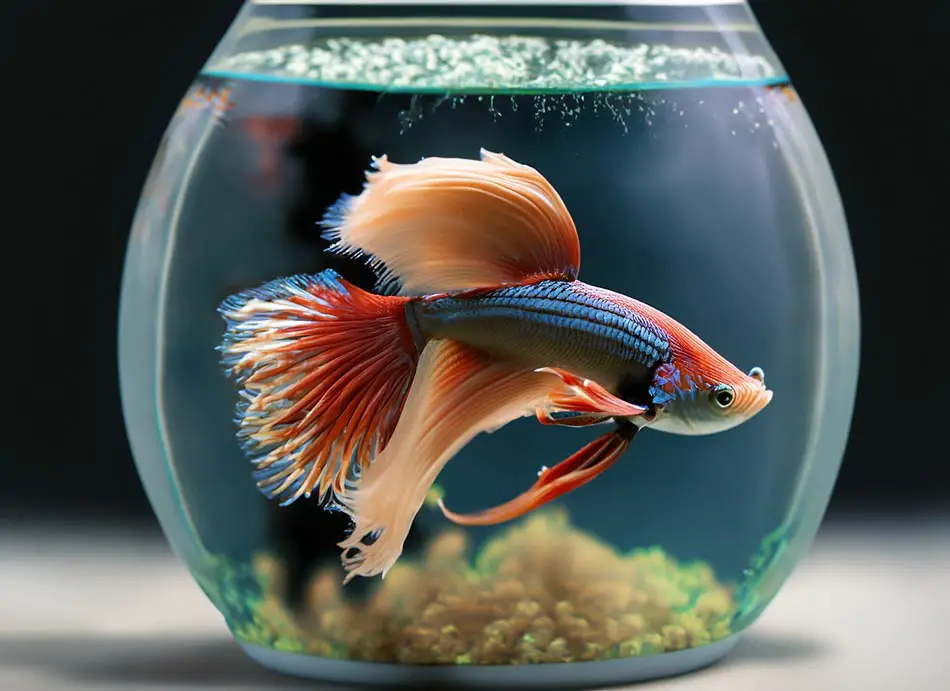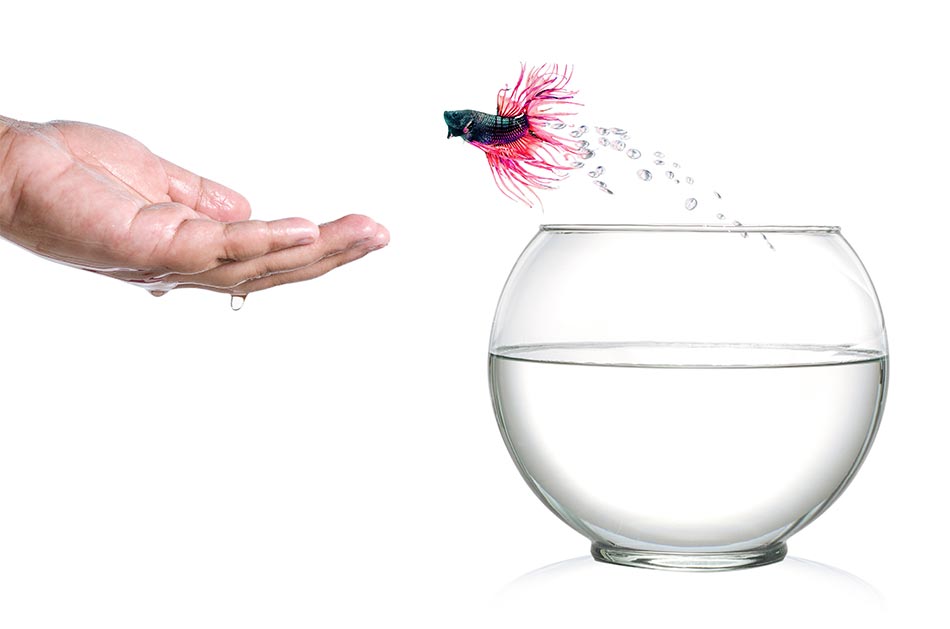Betta Fish Jumping: 7 Reasons Why & How To Prevent It!
Betta fish are beautiful and fascinating creatures, but they have many unusual behaviors and can also be quite mischievous! A common behavior you may encounter is your betta fish jumping, which can be great to watch, but it often results in them leaping clear out of the tank, whether deliberately or by accident.
Betta fish are great at jumping, and there are many reasons for this instinctive behavior, but it can be dangerous when they can’t get back into the tank.
The 7 most common reasons why betta fish jump are:
- Poor water quality.
- A lack of space in their tank.
- Poorly matched tank mates.
- It’s breathing air from outside of the tank (Yes, they can do this!)
- Poor sleep cycle
- Catching food (Flies, mosquitoes)
- They just like to jump (Playful behavior or exercising)
While jumping is quite safe in its natural habitat, if a betta fish leaps out of their tank, they have no way back in, so it’s important to understand why your betta may be jumping and how you can prevent it from happening in the future (or at least make it safer).

In this article, I’ll explain the 7 reasons listed above why betta fish jump. Once you understand this behavior, I’ll provide some useful tips on how to stop your betta fish from jumping out of the tank.
By understanding what triggers a jump in your betta and taking appropriate steps to address these issues, you can ensure your betta stays happy and healthy – right where they belong!
Don’t forget to check out our betta fish care guide for even more useful tips!
Why Is My Betta Fish Jumping Out Of The Tank?
A betta fish that keeps jumping out of its tank is one of the most alarming behaviors you can observe. It’s important to identify why your betta is exhibiting this behavior so that further incidents may be prevented.
Poor water quality and a lack of oxygen are two main culprits that can impact a betta’s health – from not having enough oxygen in the water for them to breathe to an unbalanced pH level which can cause irritation and stress on their scales.
Betta fish also live by a circadian rhythm as humans do, so sudden changes in light exposure can cause distress and confusion from a lack of sleep, leading them to jump out of their tank.
As you can see, betta fish can be very temperamental and impulsive even from minor changes in their environment, so let’s take a closer look at each of the most common reasons why your betta fish is jumping.
1. Poor Water Quality
I have owned betta fish for many years, and I can’t emphasize enough how important it is to keep an eye on the water quality of your betta fish tank.
Poor water quality can have detrimental effects on your betta’s well-being, which often causes them to jump out of their aquarium in search of cleaner water.
One of the main indicators of poor water quality is high ammonia levels, typically caused by a lack of regular water changes or general bad tank maintenance habits.
2. Lack Of Space
While many people believe that betta fish are happy in a small tank. The truth is these active fish like plenty of space where they get plenty of exercise and can mark out their territory.
If your betta doesn’t have enough room, it can lead to stress and result in them jumping out of the water in an effort to find more suitable living conditions, which is exactly how they behave in the wild.

Wild betta fish commonly inhabit the paddy fields of South-East Asia, and during the summer months, the flooded plains often dry up, leaving small puddles that separate from the main watercourse, so betta fish jump out and wriggle across the land in search of larger puddles or the main source of water.
You should always make sure that you purchase a betta tank with at least five gallons of water and provide plenty of places where your betta can hide away by using plants and ornaments.
3. Unsuitable Tank Mates
Another common reason why betta fish may jump out of their tank is putting them with unsuitable tank mates. While betta fish are often described as solitary creatures, they can live in a community tank with other fish.
Be aware that if you choose the wrong tank mates, your betta will become anxious and stressed, which are often the underlying issues causing more serious health problems.
Bettas are territorial and become aggressive if they feel their territory is being threatened by other fish. This can lead to a heightened sense of anxiety and stress that will drive them to jump out of the tank in search of safety and security elsewhere.
4. It’s Just Breathing
Betta fish have evolved to breathe through gills and a labyrinth organ, which enables them to take in atmospheric oxygen directly from the air and allows them to survive for short periods outside of water.
If your betta is frequently breathing air from the surface of the tank, it’s a sign that the level of dissolved oxygen in the water has dropped.
Ensure you are cleaning the tank frequently enough, and add some live plants or an air pump if necessary to better oxygenate the tank.
5. Poor Sleep Cycle
Maintaining a good sleep cycle for your betta fish is essential in keeping them healthy and happy. A regular routine will help keep their energy levels up, which can reduce the chance of boredom happening.
Betta fish sleep mostly during nighttime hours, so turn down or turn off the light to provide some darkness, or their body clock will go out of sync and cause poor sleep quality.
Betta fish need about 12 hours of sleep per day (which includes several short naps through the daytime) to rest fully and reset their internal clock that regulates various behaviors such as feeding patterns.

If you don’t provide a comfortable environment for them to rest, there is an increased risk of stress or disorientation which could lead to jumping out of the tank.
There are many ways to set up a calming environment, especially using plants or other decorations to make sure they feel safe and secure within their home.
QUICK FACT
Betta fish often jump onto sturdy leaves that hang above the water line where they will sleep, out of reach from the threat of predators in the water below.
6. To Catch Food
Wild betta fish are athletic swimmers, often jumping out of the water to catch food, but you should try and prevent this instinctive behavior from happening in their tank.
The best way to stop a betta fish from jumping for food is to ensure they are well-fed. Betta fish do best with a varied diet made up mostly of proteins.
A good quality betta pellet is a great staple food, occasionally mixed with live or frozen foods like brine shrimp, mysis shrimp, or bloodworms. Live food has the added benefit of satisfying a betta’s natural hunting instinct and the jumping associated with it.
Feed your betta fish twice a day and keep a regular schedule. For good digestive health, consider withholding food (fasting them) for one or two days a week.
7. They Just Like To Jump
Betta fish are natural jumpers, and just because they have become domesticated and confined to a tiny tank, it doesn’t remove their urge to jump.
Betta fish jump for a number of reasons, and one such reason is that they actually enjoy it. I would imagine it gives a sense of freedom, and it’s often witnessed in happy, playful betta fish.
Trying to prevent such a natural instinct is not always the best solution, so instead, just ensure your betta can jump safely without leaving the boundary of the tank.
How To Stop Your Betta Jumping Out Of Its Tank
While it’s quite natural for betta fish to jump, it becomes a problem if they are jumping out of the tank and onto the floor outside.
Even though betta fish can breathe out of the water for prolonged periods, warm weather may dry out their protective slime coat, or they may sustain injuries from the fall.
Excessive jumping can also be a sign that your betta is stressed and unhappy, which can eventually lead to illness.
While you shouldn’t try and stop your betta fish from jumping altogether, there are several ways to reduce the behavior and, more importantly, prevent them from jumping out of the confines of their tank.

The main steps you should take to reduce jumping and keep your betta from leaving the tank are:
Regular tank maintenance – Clean water is essential and reduces the chance of ammonia poisoning from waste buildup. Poor water conditions will have your betta instinctively searching for a cleaner environment to live in, so check your water parameters frequently and keep your betta fish tank clean.
Provide a natural light routine – While many fishkeepers keep their tank lights on at night, it’s not natural and doesn’t allow a proper sleep cycle, eventually causing stress and poor health. The best option is to dim or turn the aquarium lights off at night. Live aquatic plants also provide shade during the day, which makes your fish comfortable to nap.
Check the water temperature – A tank that is too warm can make a betta much more active and likely to jump, whereas a cold tank has the opposite effect making them more sleepy. To keep your fighting fish happy and healthy, the ideal temperature should be 75-80°F.
Get a larger tank – A larger betta tank provides more space and freedom to swim around, so they will feel less confined. This by itself should remove the betta’s need to escape and will help prevent your betta from getting bored. Consider a 20-gallon tank or larger so you can add plenty of plants and ornaments to help your betta feel comfortable and safe.
Get a fish tank cover – Tank lids or covers are the easiest way to prevent a betta from jumping out of the tank, and a tall enough cover allows your betta to jump within its confines. If you can’t find a cover, use some perspex to raise the rim of the tank.
Add floating live plants – Not only are they a great source of shade, but floating live plants also create a barrier, preventing your betta fish from jumping so easily. Some popular and widely available floating plants are duckweed and frogbit.
Choose suitable tank mates – If you want to add your betta to a community tank, carefully research some suitable tank mates. Small fish like tetras and harlequins are ideal, while docile fish like mollies and plecos will keep to themselves.
How High Can A Betta Fish Jump?
An average betta fish is capable of jumping 2-3 inches above the water surface line and even higher in extreme cases. A healthy betta’s maximum vertical leap depends on factors such as age, the size of the tank, and the amount of water in the tank.
A large but shallow tank can prevent enough upward momentum for a high jump, and obstructions at the surface, such as floating plants, can also hinder a betta’s ability to jump.
Why Is My Betta Fish Jumping At Night?
Jumping at night is uncommon behavior in betta fish as they typically sleep for most of the night. If your betta is jumping frequently at nighttime, you should first identify the reason they are awake.
Betta fish don’t need light at night and cope perfectly well in the wild without it, so ensure to dim or turn off the tank lights and remove other strong lights from nearby their tank.
It’s not just light that can keep a betta fish awake, noise can also be a problem. While a television with a bright strobing light can startle a betta, radios and other loud objects can keep your betta from sleeping comfortably. Anything that may wake your betta suddenly in the night may cause them enough anxiety to jump from the tank.
How Long Can Bettas Survive Out Of Water?
Generally speaking, most adult bettas can last up to 12 hours out of the water as long as their slime coat remains moist. High humidity levels and temperatures help prevent drying.
It’s quite common for betta fish to jump onto a floating leaf within the tank confines, where it will sleep happily for several hours before sliding back into the water.
Finding Your Betta Fish Out Of Water
If you find your betta fish out of the water, it’s important to act quickly and do whatever is possible for the best chance of survival.
First and most importantly, get them back into the water to prevent further drying. If a betta’s gills begin to dry out, it can cause difficulty in breathing.
A common treatment for skin and gill conditions in betta fish is aquarium salt, so if you feel they are struggling to breathe, make a salt bath to help revive them.
Aquarium salt is also very soothing and healing which will help repair any damage sustained to their delicate slime coat.
Provided you have acted quickly and no serious injuries were sustained, your betta should make a full recovery.
If your betta fish jumps frequently, it will likely get injured from time to time, so it’s always wise to keep some aquarium salt to hand, but there are several other suitable treatments I will share with you.
What I Use
API Aquarium Salt – An excellent all round natural remedy for treating skin and gill conditions.
Indian Almond Leaves (Check Price) – Releases tannins into the water, which have antifungal and antibiotic properties.
API Stress Coat (Check Price) – A natural remedy that can help heal many scale and skin issues.
API Bettafix (Check Price) – A medicated treatment for healing wounds and other ailments such as parasites and fungus.
Betta Jumped Out Of Tank And Died
Sadly not all betta fish will survive a leap of faith out of their tank. Jumping can often be fatal, which is why precautions should be put in place as soon as possible, giving them the best chance of survival.
While betta fish often jump for fun, I would first check water parameters such as oxygen levels and ammonia levels to ensure they are not to blame, which could affect other fish in the tank.
Once you have established your water parameters are within their ideal range, check the many preventative measures throughout this article to help keep your future betta fish safe.
How Do You Train A Betta Fish To Jump?
Training a betta fish to jump is not overly difficult and can be achieved with patience, consistency, and lots of practice. Before starting the training process, it’s best to make sure that your tank is safe for jumping by checking the size, height, and water level.
The next step in training a betta fish to jump is creating a hoop out of an object, such as a plastic ring or even a paperclip intertwined around two straws.
When introducing the hoop to your betta, you’ll want to start slow, coaxing your betta to swim through the hoop underwater. You can do this by placing just enough food on one side of the hoop for your fish to notice it. As soon as he does, keep the hoop in the way until he swims through it and retrieves his reward.
With time and repetition, it will become easier and more natural until, eventually, you can raise the hoop slightly so that he has to jump in order to get his treat.
An alternative method is to place some food on your fingertip and hold it above the water. Over time your betta will know what to do. Check out the video below, which shows male and female betta fish jumping at a finger.
With regular practice sessions, most bettas are able to learn how to jump within a week or two. If progress seems slow, try adding some toys they can interact with inside their aquarium to help keep things interesting and to motivate them further on their learning journey!
Conclusion
If you want to stop your betta fish jumping out of the tank, the best solution is to create a healthy environment.
Poor water quality, lack of space, and poor sleep cycles are all contributing factors to why your fish may be trying to escape their aquarium home.
It’s important to keep in mind that if you do find your betta on the floor or another area outside of its tank, time is of the essence – they won’t last long without water if their slime coat dries out!
High rims, tank hoods, and plenty of plants are all effective ways to reduce the likelihood of your betta jumping outside the boundaries of the tank while allowing them the freedom to jump safely.








